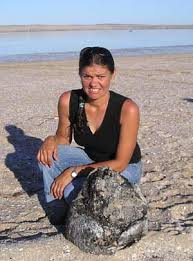The Difference Between Men and Women
by Con Chapman
When sixth-grade science teacher Pat Farrell assigns an earth-science lab on measuring crystals, the girls collect their materials . . . read the directions and follow the sequence from beginning to end. The first thing boys do is ask, “Can we eat this?”
The Trouble With Boys, Newsweek.

The search team from Afternoon in Paris Perfumes had been combing the pristine New Zealand beach for hours, hoping to find ambergris—the hard yet waxy substance that is formed in the stomachs of sperm whales from the undigested beaks of squid that they eat. Used by the cosmetics industry as a fixative for fine perfumes (and privately by individuals as an aphrodisiac) the rare and valuable substance gives off an odor that some say brings to mind scented cow dung, leading one to ask—how the hell do they know what scented cow dung smells like?
“We'll camp here for the night,” said crew leader Linda Roget, Director of Research for the perfume company. She slipped off her backpack and removed her collapsible tent from its waterproof sack.

Just then a cry was heard from down near the water. Rob Merriwether, Assistant Collector of Samples, had found something.
“Look,” he shouted. “I think this is the real thing.” The others gathered around to examine the white, grey, black or brown object that was either flat or square but also somewhat rounded, with a texture that was soft and sticky like melting tar but sometimes hard, like dry clay.

“Let me see that,” Roget said, brushing her hair back from her forehead with the back of one hand. “Hmm,” she said. “I think this is worth saving.” She called out to her chief chemist, Barbara da Costa.
“Barbara!”
“Yes, Linda,” her co-worker said as she ran down to the water's edge.
“Take a look at this,” Roget said as she handed her the specimen.
“Looks promising,” the chemist replied as she examined the musky-smelling hunk of congealed whale vomit. “Do you want me to run the usual tests on it?”
“Precisely,” Roget replied.
“Wait a minute,” Rob Merriwether interjected. “I found it.”

“You know this is company property,” Roget said to him sternly, her left eyebrow raised upwards towards her forbidding widow's peak .
“I just want a couple of bites,” Merriwether said. “We finished the Milk Duds over an hour ago.”
The mood in the operating room was somber as doctors raced to save the life of Clifton Remington, Assistant Liaison to the Undersecretary of State for Cross-Border Relationships.

Dr. Winslow Crocker, Jr., the dean of adenoid surgeons in the highly-competitive Boston-Cambridge medical community, held his arms out while a nurse stretched rubber gloves onto his hands in preparation for surgery.
Just then the operating room doors flew open and in walked Dr. Beverly Orvallis, upstart surgical enfant terrible, fresh from a lecture at the Harvard Medical School on minimally invasive strategies for correcting the debilitating effects of Osgood-Schlatter's Disease.

“Just a minute,” she said in a defiant challenge to Crocker's authority. “You're not going to use the outmoded and potentially fatal Heinz-Szabo technique to remove this man's adenoids, are you?”
Crocker's lips curled in what was at the same time a smile and a sneer, both of them dripping with contempt, as he looked at his former student. “What would you suggest—Doctor?” he said in a condescending tone.

“This!” she exclaimed as she quickly plunged an Italian stiletto-style curette behind the man's soft palate. A quarter-turn of her hand and she held aloft the fruits of her labor-two gleaming gobs of lymphatic tissue that had been blocking the nasopharynx of the unconscious attaché.
“Let me see them,” Crocker said with a curious expression.
“Sound medical protocol calls for these to be sent to the lab immediately!” Orvallis replied, suspicious of his intentions.

“I want to know if they shrivel up like oysters when you put salt on them,” he said before turning to an orderly and shouting, “Get me some cocktail sauce-pronto!”
The quest for the Canadian Cabbage butterfly-mortal enemy of radishes, turnips, cauliflower and, of course, cabbages—had extended into the dark Quebec night. Search-and-capture squads had switched to fluorescent “black light” tubes in order to pursue their quarry unseen. Evelyn Urquart, head of the expedition, was fearful that if she forced her crew to march further she'd have a lepidopteran mutiny on her hands.

“This is far enough. Let's just collect a few pupae and call it a night,” lapsing into laboratory Latin with fatigue.
Her subordinates began to pick through rolled leaves, twigs and loose bark to find the cryptically camouflaged cocoons, but without much luck.

Then, from over her shoulder, Urquart heard a crackling sound.
“Kinda crunchy,” a male voice said. “Like pork rinds.”
|
0
favs |
1398 views
0 comments |
876 words
All rights reserved. |
Author's Note
The author has not attached a note to this story.
Other stories by Con Chapman
Tags
This story has no tags.